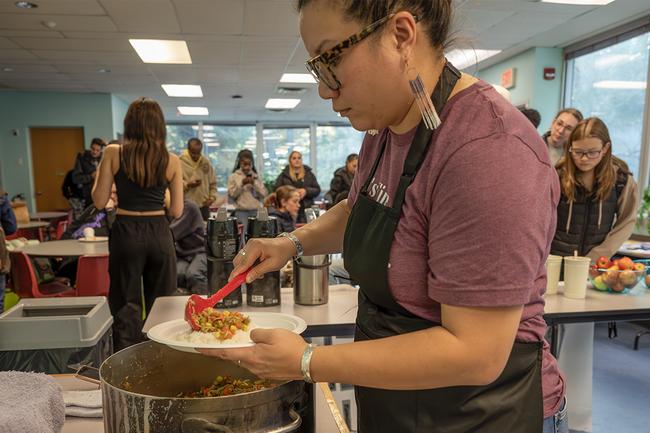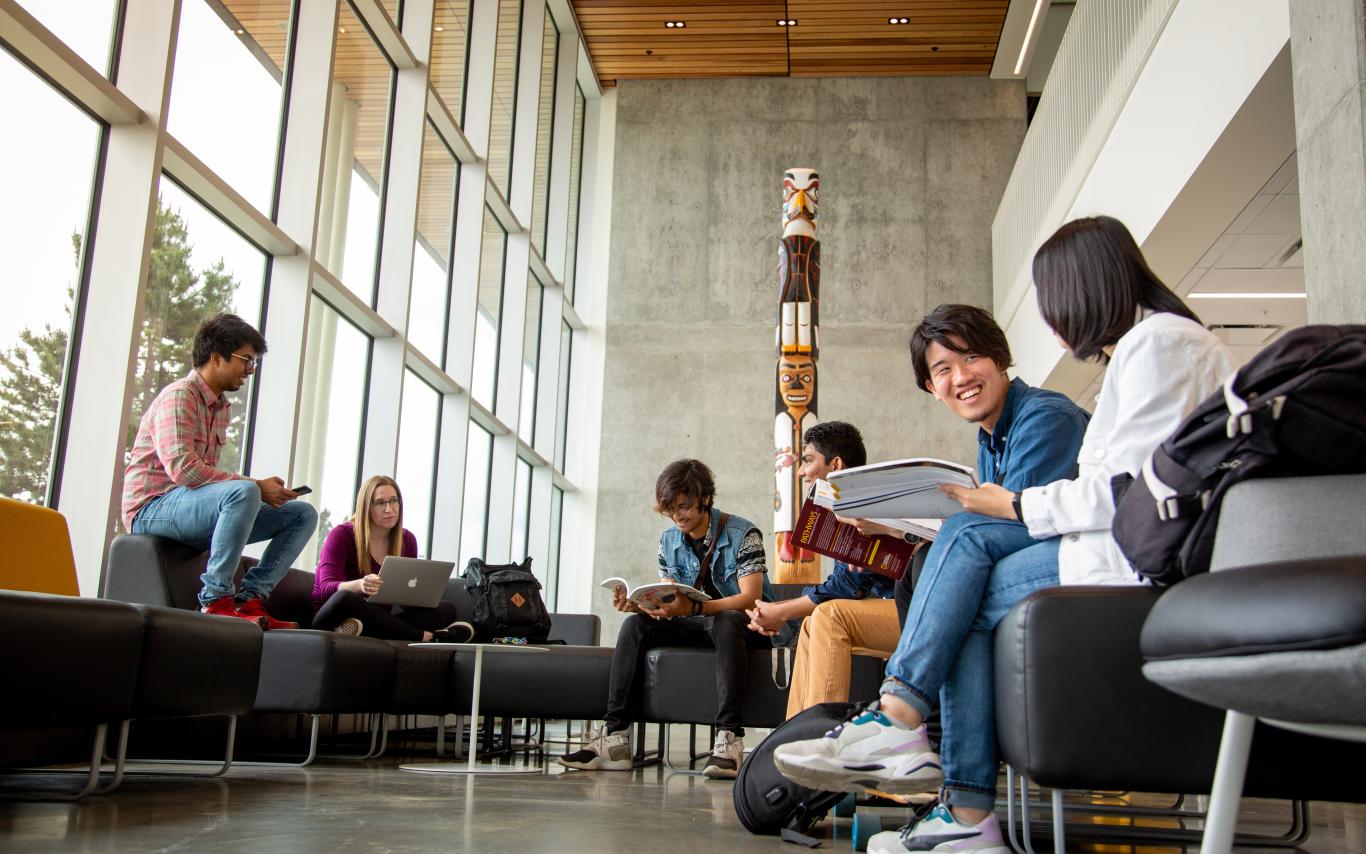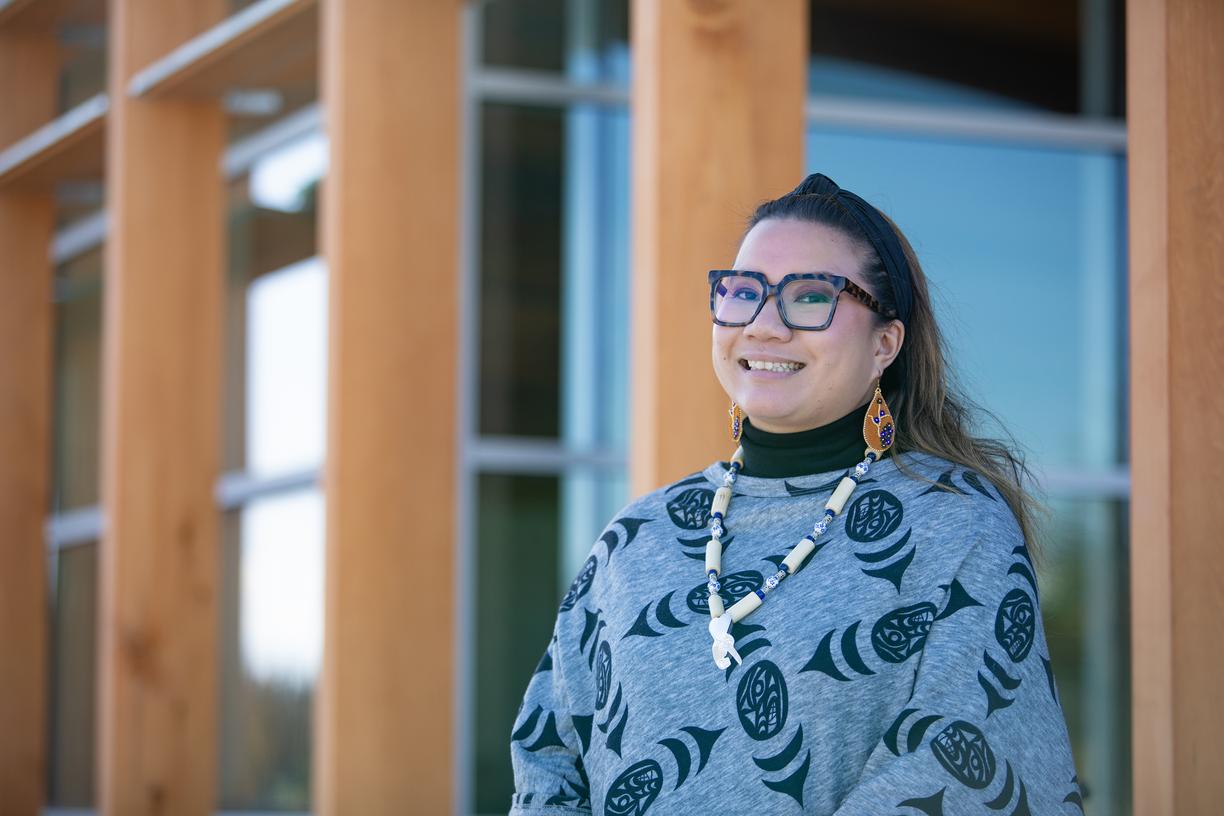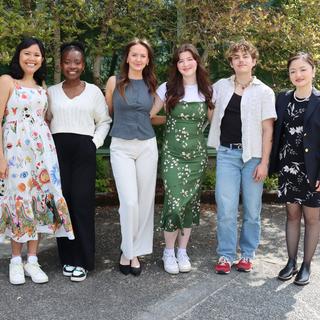Leah Vaisanen shares her journey
Ten years ago, if you asked Leah Vaisanen where she would be right now, walking across a stage wearing cap and gown would never have crossed her mind as a possibility.
Not only is she finishing her Bachelor of Arts, Major in Political Studies, Minor in Indigenous/Xwulmuxw Studies in high academic standing, but she’s already landed a high-profile job with a national organization. And the number of awards and accolades in recognition of the impact she’s had on campus – and beyond – continues to stack up.
“I feel proud of what I’ve accomplished,” says Leah, who started work as Policy Lead-MMIWG2+ with the Native Women’s Association of Canada last November – before she graduated. “I really developed into a strong Indigenous woman in leadership.”
A story of perseverance
Today the world sees a confident, well-spoken, intelligent woman who is not afraid to speak up and call out injustice where she sees it, but Leah says her journey to this point was rocky at times.
“I really persevered into the woman I am today,” she explains. “I just can’t say enough about the support system that I’ve had here in the last four years, from my professors to my colleagues and friends. I don’t think I’d be where I am now without them.”
Leah, whose mother is from Łı́ı́dlı̨ı̨ Kų́ę́ First Nation in Fort Simpson, Northwest Territories, first moved to Nanaimo from Edmonton in 2009. Her first attempt at post-secondary – doing some upgrading courses with the hope of studying nursing – didn’t go well. Thinking post-secondary just wasn’t for her, she left school and worked in the hospitality industry for a decade until the Su’luqw’a’ Community Cousins Indigenous mentorship program drew her back in. But the first two years of university were a struggle as she tried to figure out what she wanted to major in and wrestled with self-doubt.
“Being a mature student at 38 and the oldest one in most of my classes, and being a minority, I always had my doubts about whether I was good enough, smart enough and if I belonged at university,” she says. “The first two years were a big transition, I really dug deep.”
The turning point
In her third year, Leah became the Indigenous Students’ Representative with the VIU Students’ Union – a role she embraced in her desire to enhance the on-campus experience for her peers. She organized events and became a strong advocate, ensuring the voices of Indigenous students did not get lost.
“It really pushed me out of my comfort zone. I wanted to make a difference and raise up Indigenous voices,” she said. “I was always the quiet one, just kind of getting by. Over the past two years, it’s like the sun rose.”
This role led to a position with the BC Federation of Students as Indigenous Caucus Chairperson, through which she honed her leadership skills at a provincial level.
“From the moment she stepped into the role of Indigenous Students’ Representative, I watched Leah make it her own,” says Janelle Wilson, Organizer of Strategic Priorities and Governance with the VIU Students’ Union. “She created a space where Indigenous students knew they could turn to her for support, and where her presence was felt whenever it mattered most. I also deeply admire the work Leah did as Chairperson of the BC Federation of Students’ Indigenous Students’ Caucus, where she represented Indigenous students from across British Columbia. She used that platform to push for systemic change, advocate for culturally appropriate supports and challenge institutions to do better.”

This past year, Leah also started No Hunger at VIU. Throughout the academic year, Leah, student volunteers and Political Studies Professor Dr. Lauren Touchant served two hot meals per month to any student who needed one and distributed care packages.
The group served more than 100 students for every homecooked meal they put together and soon secured funding from Student Affairs to continue the project throughout the school year.
This work has earned Leah several awards, including: a 2025 Women of Influence Nanaimo award, the VIU Faculty Association’s 2024 Community Engagement Award and a Pro-Diversity Award at the 2023 CREATE student research conference.
Pushing for change
These leadership experiences helped solidify the direction she wanted to take her career. With the guidance of Drs. Touchant and Jocelyne Praud, two of her Political Studies professors, she began taking courses in public policy and then interviewed for the position with the Native Women’s Association of Canada.
As Policy Lead-MMIWG2+, she is doing policy research, project management, stakeholder engagement and relationship building, all with the aim of making a difference in the missing and murdered Indigenous women and girls crisis. As a Survivor of abuse herself, she brings lived experience to her new role.
“I’m grateful to get this position before even graduating,” she says. “I want to help bring forward the justice that Indigenous women and girls deserve. This is a good stepping stone in gaining experience and putting everything I learned in Political Studies into practice.”
Touchant says it’s been a pleasure to watch Leah flourish and transform as she found her path.
“Her academic pursuits have been fueled by a deep commitment to becoming a community organizer and a dedicated advocate for Indigenous women, girls and two-spirited,” she says. “Leah has demonstrated exceptional leadership across various governance settings while showcasing remarkable resilience as a student. I am confident that her experiences and education have prepared her to become a powerful beacon for policy change.”
So far, Leah is working on policy files that range from human trafficking to RCMP procedures around body cameras. She helped author her organization’s annual scorecard on the federal government’s MMIWG2S+ National Action Plan. It has been six years since the National Inquiry into MMIWG released the 231 Calls for Justice, and four years since the release of the National Action Plan to answer the Inquiry’s calls.
“We need to get some feathers ruffled in all levels of government to start working on these actions,” she says. “There’s a lot of work to do and we really need to start doing it.”


